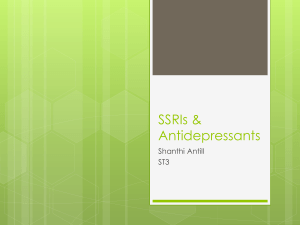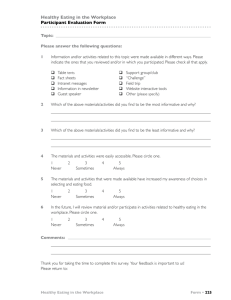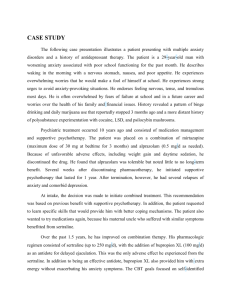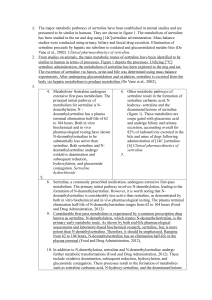Sertraline in Underweight Binge Eating/Purging-Type Eating Disorders: Five Case Reports
advertisement
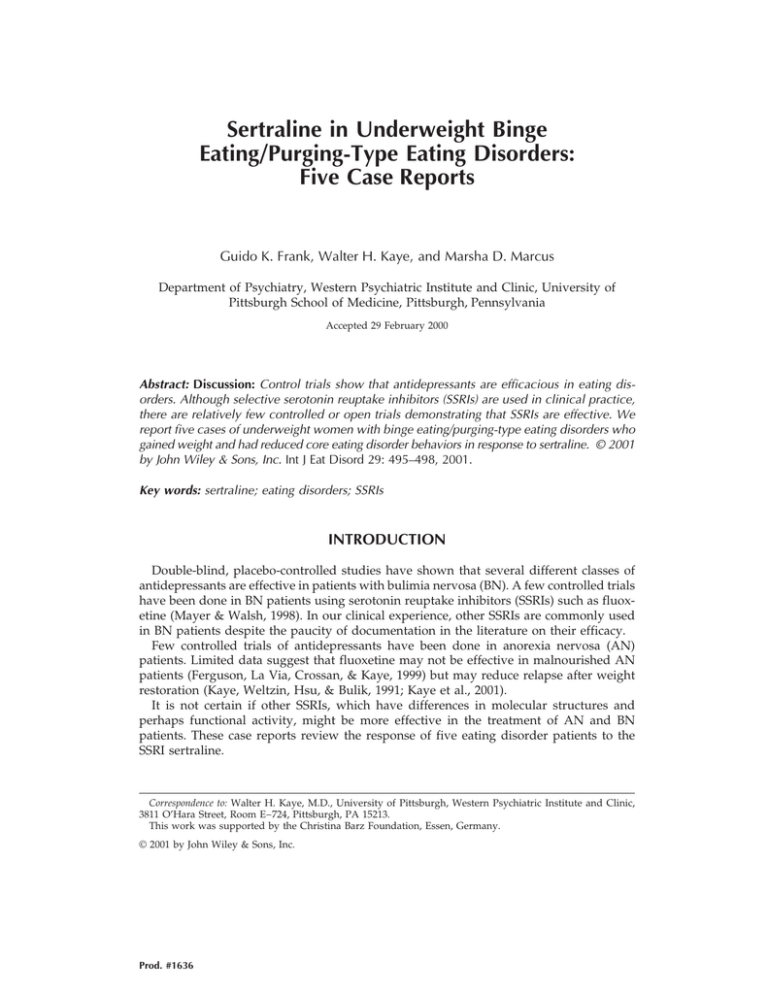
Sertraline in Underweight Binge Eating/Purging-Type Eating Disorders: Five Case Reports Guido K. Frank, Walter H. Kaye, and Marsha D. Marcus Department of Psychiatry, Western Psychiatric Institute and Clinic, University of Pittsburgh School of Medicine, Pittsburgh, Pennsylvania Accepted 29 February 2000 Abstract: Discussion: Control trials show that antidepressants are efficacious in eating disorders. Although selective serotonin reuptake inhibitors (SSRIs) are used in clinical practice, there are relatively few controlled or open trials demonstrating that SSRIs are effective. We report five cases of underweight women with binge eating/purging-type eating disorders who gained weight and had reduced core eating disorder behaviors in response to sertraline. © 2001 by John Wiley & Sons, Inc. Int J Eat Disord 29: 495–498, 2001. Key words: sertraline; eating disorders; SSRIs INTRODUCTION Double-blind, placebo-controlled studies have shown that several different classes of antidepressants are effective in patients with bulimia nervosa (BN). A few controlled trials have been done in BN patients using serotonin reuptake inhibitors (SSRIs) such as fluoxetine (Mayer & Walsh, 1998). In our clinical experience, other SSRIs are commonly used in BN patients despite the paucity of documentation in the literature on their efficacy. Few controlled trials of antidepressants have been done in anorexia nervosa (AN) patients. Limited data suggest that fluoxetine may not be effective in malnourished AN patients (Ferguson, La Via, Crossan, & Kaye, 1999) but may reduce relapse after weight restoration (Kaye, Weltzin, Hsu, & Bulik, 1991; Kaye et al., 2001). It is not certain if other SSRIs, which have differences in molecular structures and perhaps functional activity, might be more effective in the treatment of AN and BN patients. These case reports review the response of five eating disorder patients to the SSRI sertraline. Correspondence to: Walter H. Kaye, M.D., University of Pittsburgh, Western Psychiatric Institute and Clinic, 3811 O’Hara Street, Room E−724, Pittsburgh, PA 15213. This work was supported by the Christina Barz Foundation, Essen, Germany. © 2001 by John Wiley & Sons, Inc. Prod. #1636 496 Frank, Kaye, and Marcus CASE REPORTS Patient 1 An 18-year-old single White female (SWF) presented at 81% of ideal body weight (IBW). She binged and purged about once per day and used laxatives twice per week. She was preoccupied with weight and shape and was depressed and anxious. She had decreased energy and difficulty concentrating, anhedonia, hopelessness, and passive suicidal ideation for several weeks. After a month of outpatient psychotherapy, she was started on a trial of fluvoxamine up to a maximum dose of 100 mg per day. After 4 months in outpatient treatment, she was admitted to the partial hospital program for 2.5 months due to her persistent symptoms. She was then sent back to outpatient therapy. By the ninth month of treatment, her weight was at 85% IBW, she complained of daytime tiredness, and was still significantly depressed. Fluvoxamine was discontinued. She was started on Sertraline, which was increased to 100 mg per day. Over the next 8 weeks, her mood improved and she also reported a reduction of obsessions about food and weight concerns. After 5 months on sertraline, her weight had increased to 98% IBW. The dose was increased to 125 mg per day when she started to restrict in the fifth month of treatment. By the tenth month of treatment with sertraline, her weight was 97% IBW. She still continues to binge and purge about once every other week to once per week. Patient 2 An 18-year-old SWF was admitted at 87% IBW to the outpatient clinic. She consumed about 800 kcal of food per day, binged once a week, and vomited twice per day. She was obsessed with thoughts of food and weight, exercised compulsively, and had been amenorrheic for several months. She compulsively brushed her teeth 20 times a day, was only able to eat when she used special utensils, and would not mix foods on her plate. In addition, she reported symptoms of a current major depression. She was treated in outpatient therapy for 5 months and received paroxetine at a maximum dose of 40 mg per day. She intermittently took 50 mg of trazodone to improve her sleep. From the sixth to the ninth month of treatment, she received partial hospitalization treatment, during which time she overdosed on pain medication. Her weight was at 90% IBW when she was returned to individual therapy. She still suffered from severe depressive mood, weight preoccupations, and body distortions. In the tenth month of therapy, she was switched to sertraline at a maximum dose of 100 mg per day. Over the following 4 weeks, she reported a decrease in her mood instability, felt more relaxed, and obsessed less about food. She reported a significant reduction of food-related anxieties and gained weight. After 3 months, her menstrual cycle resumed. After 10 months of taking sertraline, she denied any binge or purge episodes within 2 months and was stable at 93% IBW for the same time. Her menstrual cycle had occurred regularly since resumption. She denied any significant preoccupations with weight or shape concerns or depressive symptoms. Patient 3 A 19-year-old SWF presented at 80% IBW with severe weight and shape concerns, restricted eating for the 12 months prior to admission, compulsive exercising (up to 3 hr per day), and frequent use of laxatives. She was depressed with loss of interest and sleep disturbance. She also had compulsive cleaning, ordering, and ritualistic hand-clapping behaviors. During partial hospital treatment, she was started on sertraline, which was Sertraline in Patients with Eating Disorders 497 gradually increased to 100 mg per day. After 2 months, she was discharged and placed in outpatient therapy. After 4 weeks of sertraline treatment, she reported less depression and less intense core eating disorder symptoms. After 15 weeks of treatment, her body weight had increased to 92% IBW and her menstrual cycle had resumed. She denied depressive or obsessive compulsive symptoms and had a marked decrease in food and weightrelated preoccupations. Patient 4 An 18-year-old SWF at 82% IBW was admitted to the partial treatment program. She had a history of restricted eating behavior, preoccupation with food-related thoughts, irregular use of laxatives, and she was highly anxious about weight gain. One month prior to admission, she had been started on 50 mg per day of sertraline for depressed mood which had improved by the time of admission. After admission, her dose of sertraline was gradually increased to 150 mg per day. After 12 weeks of partial hospitalization, she was transferred to the outpatient program at 86% IBW. By the fifth month of treatment, her weight had increased to 100% IBW. She had improved eating behavior in terms of less restricted eating, but she had started to engage in binge episodes. She continued to have weight-related preoccupations but had reduced depressed mood. Patient 5 A 14-year-old SWF was admitted to the partial hospital program at 83% IBW. She had a history of nearly daily self-induced vomiting after meals, restricted eating behavior, excessive exercising, and amenorrhea for several months prior to admission. She also reported depressive symptoms with a sleep disturbance, feelings of worthlessness, and passive suicidal thoughts. She was started on sertraline at a maximum dose of 75 mg per day. After 3 months in the partial hospital program, she was transferred to the outpatient clinic. After 4 weeks of treatment, she stopped vomiting and noted a reduction of depressive feelings and sleep problems. After 4 months of treatment, she denied any depressive symptoms or preoccupations with shape and weight-related thoughts, and her menstrual cycle had resumed. Her weight continuously increased so that she was at 93% IBW by the seventh month of treatment. DISCUSSION These case reports suggest that sertraline may be useful in the treatment of people with eating disorders. It was associated with a reduction in core eating disorder symptoms, depression, and obsessional thoughts. It is important to note that underweight subjects often do not respond to SSRIs (Ferguson et al., 1999). Moreover, it is difficult to get underweight people with an eating disorder to gain weight outside of a hospital setting (Deep-Soboslay, Sebastiani, & Kaye, 2001). Does sertraline have an advantage over other SSRIs in terms of helping eating disorder subjects gain weight? The five presented subjects did not report substantial side effects. However, a sixth subject with binging/purging symptoms developed a hypomanic state on sertraline while she was at 85% IBW. Although SSRIs have similarities in terms of blocking serotonin reuptake, these compounds have different molecular structures and may have different central nervous sys- 498 Frank, Kaye, and Marcus tem effects. For example, sertraline has effects on noradrenergic transmission (Thomas, Nutt, & Holman, 1998; Eap & Baumann, 1996; DeVane, 1998). In summary, these case reports suggest that sertraline may have particular effectiveness in terms of weight restoration and decrease of depressive and obsessional symptoms in underweight women with binge eating/purging-type behaviors. However, case reports cannot disentangle the effects of other treatments or the natural course of recovery. Thus, determining whether sertraline is a useful treatment will require a double-blind, placebocontrolled trial. REFERENCES Deep-Soboslay, A., Sebastiani, L., & Kaye, W.H. (2001). Weight gain in AN: Efficacy of inpatient and intensive outpatient treatment. Manuscript submiitted for publication. DeVane, C.L. (1998). Differential pharmacology of newer antidepressants. Journal of Clinical Psychiatry, 59 (Suppl. 20), 85–93. Eap, C.B., & Baumann, P. (1996). Analytical methods for the quantitative determination of selective serotonin reuptake inhibitors for therapeutic drug monitoring purposes in patients. Journal of Chromatography B: Biomedical Applications, 686, 51–63. Ferguson, C.P., La Via, M.C., Crossan, P.J., & Kaye, W.H. (1999). Are serotonin selective reuptake inhibitors effective in underweight anorexia nervosa? International Journal of Eating Disorders, 25, 11–17. Kaye, W.H., Nagata, T., Weltzin, T.E., Hsu, L.K.G., Sokol, M.S., McConaha, C., Plotnikov, K.H., Weise, J., & Deep, D. (2001). Successful outcome of restricting-type anorexia nervosa after the double-blind placebo-controlled administration of fluoxetine. Manuscript submitted for publication. Kaye, W.H., Weltzin, T.E., Hsu, L.K., & Bulik, C.M. (1991). An open trial of fluoxetine in patients with anorexia nervosa. Journal of Clinical Psychiatry, 52, 464–471. Mayer, L.E., & Walsh, B.T. (1998). The use of selective serotonin reuptake inhibitors in eating disorders. Journal of Clinical Psychiatry, 59 (Suppl. 15), 28–34. Thomas, D.N., Nutt, D.J., & Holman, R.B. (1998). Sertraline, a selective serotonin reuptake inhibitor modulates extracellular noradrenaline in the rat frontal cortex. Journal of Psychopharmacology, 12, 366–370.



